
There's a slight pronunciation difference between withdraw and withdrawal, and their definitions are also quite close. But the ways that you use these words in a sentence are actually quite different. Learn when to use withdraw and withdrawal, and never make this grammar mistake again.
Choosing Withdraw or Withdrawal
Both withdraw and withdrawal come from the Middle English origin (with - "away," draw - "take"). But that doesn't mean you can use them the same way.
- withdraw (verb) - to remove
- withdrawal (noun) - the item you just removed
For example, you make a withdrawal when you withdraw money. While the difference seems easy enough when you read it, using these similar-sounding words correctly in spoken conversation is another matter.
Withdraw Meaning: To Remove
The verb withdraw (with-DRAW) is commonly found in conversations about money. But there are actually two ways to use it: as a transitive verb (the action transfers to a direct object) and as an intransitive verb (the action does not transfer to a direct object).
How to Use Withdraw as a Transitive Verb
Using withdraw as a transitive verb means that you are withdrawing an item, which functions as the direct object in the sentence. For example:
- Spencer withdraws $100 from his account every week.
- The president chose to withdraw 2,000 troops from the war.
- You should withdraw your application if you don't plan to accept the job.
How to Use Withdraw as an Intransitive Verb
You can also use withdraw without a direct object. In these cases, the subject is withdrawing from a situation. For example:
- I signed up for the wrong class, so I'll withdraw.
- The soldiers in enemy territory must withdraw.
- Marcy is so shy around new people that she tends to withdraw.
Is Withdrawed or Withdrew Correct?
Because withdraw is an irregular verb (as is the verb draw), its past tense form is withdrew. In this form, it can either be transitive or intransitive. For example:
- Did you know that Piper withdrew over $500 yesterday?
- I withdrew my name from consideration when I was accepted to a different college.
- Shelby wanted to talk to her crush, but he withdrew from the group chat.
Withdrawal Meaning: Something You Have Removed
When you withdraw something, the item you withdrew is a withdrawal. It's pronounced the same way as withdraw, but with an "l" at the end (with-DRAWL). Like all nouns, withdrawal can be the subject or direct object in a sentence.
How to Use Withdrawal as the Subject
You may see withdrawal as the subject of a sentence when the rest of the sentence relates to it. For example:
- The military withdrawal is the biggest news story of the day.
- Yesterday's withdrawal will help to pay our bills.
- Withdrawal from drugs can cause people to feel physically sick.
How to Use Withdrawal as the Object
The most common use of withdrawal is the object of the verb make. However, it can function as the object of other transitive verbs as well. For example:
- Can I make a withdrawal right after depositing a check?
- You may experience a physical withdrawal if you stop taking your prescription.
- The candidate announced his withdrawal from the election.
How to Use Withdrawal as the Object of a Preposition
Another usage of withdrawal is as the object of a preposition within a prepositional phrase. For example:
- When patients go through alcohol withdrawal, it's best for them to be in a doctor's care.
- I paid for the boat with a large withdrawal from my savings account.
- The protesters called for a withdrawal from the foreign conflict.
What About Withdrawn?
The word withdrawn is a participial adjective that describes someone's shy or reserved personality. While the person hasn't literally withdrawn themselves from a situation, they may be quiet and reluctant to talk to others. For example:
- My sister has always been shy and withdrawn in big groups.
- Did the puppy seem withdrawn to you?
- The teacher, who was usually perky and outgoing, appeared tired and withdrawn to her students.
Don't Withdraw From Fixing Your Grammar
Tricky word pairs such as withdraw and withdrawal don't need to be so confusing. Once you can use withdraw as a verb and withdrawal as a noun, you can avoid making mistakes in the future. For more fixable grammar issues, check out the difference between then vs. than when referring to comparisons.